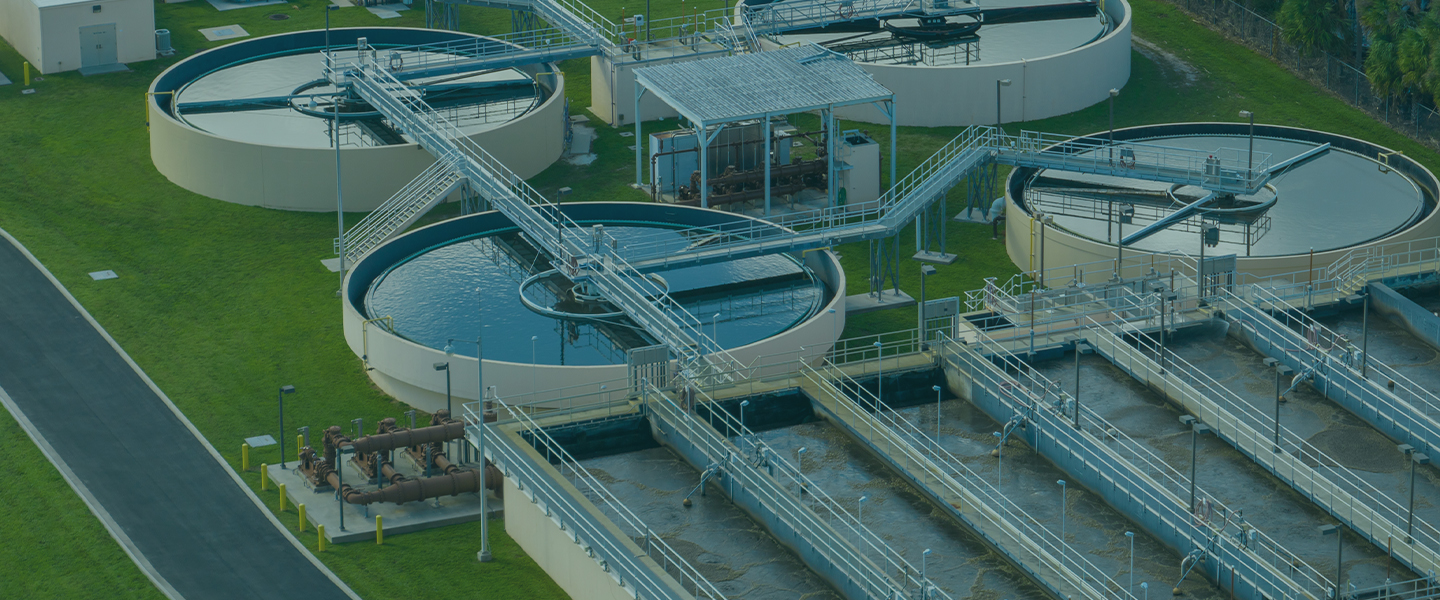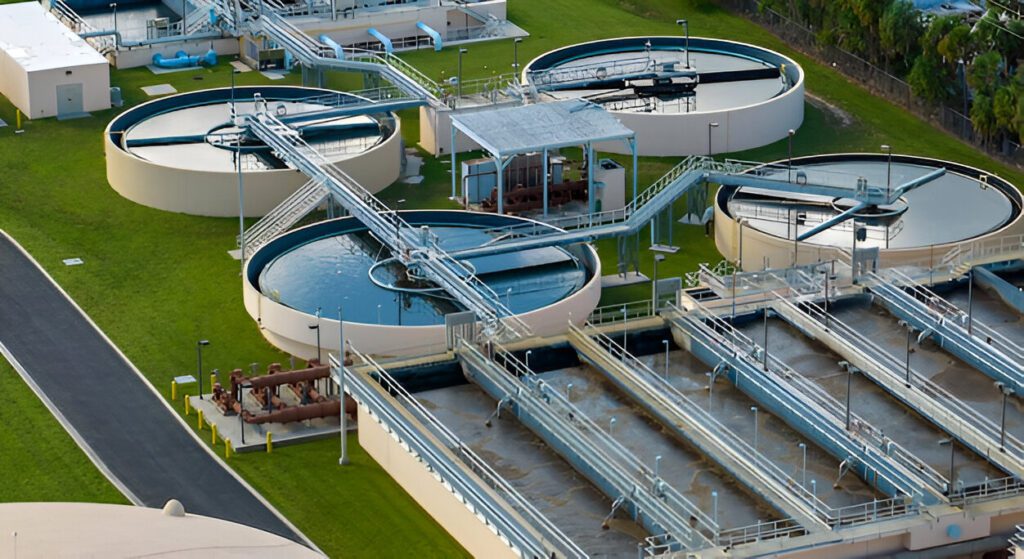
Digi Smart – Effluent Treatment Plants (ETP)
Importance
Industries generate wastewater containing harmful pollutants that can adversely impact the environment if not treated properly. Effluent Treatment Plants (ETPs) play a crucial role in treating industrial wastewater to ensure it meets regulatory standards before discharge or reuse. At PT Ecological Services, we provide advanced, efficient, and compliant ETP solutions designed to remove contaminants, reduce environmental impact, and promote water conservation.
What is an Effluent Treatment Plant (ETP)?
An Effluent Treatment Plant (ETP) is a specialized facility designed to treat industrial wastewater by removing suspended solids, dissolved pollutants, and toxic substances. Our cutting-edge ETP solutions help industries manage wastewater efficiently, ensuring regulatory compliance and environmental sustainability.
Importance of Effluent Treatment Plants (ETP)
Why Industries Need Them
Industrial processes generate large volumes of wastewater that often contain hazardous chemicals, heavy metals, oils, and other toxic pollutants. If released untreated, this wastewater can severely harm aquatic life, degrade natural ecosystems, and pose serious health risks to humans.
Effluent Treatment Plants (ETPs) are essential for mitigating these environmental and health risks. They help:
- Remove harmful pollutants from industrial wastewater before it is discharged.
- Ensure compliance with national and local environmental regulations.
- Prevent contamination of water bodies and soil.
- Promote resource reuse through water recycling and recovery.
- Enhance corporate sustainability and environmental responsibility.
In today’s regulatory and eco-conscious environment, implementing an ETP is not just a legal obligation—it’s a smart, sustainable, and ethical business decision.
Why Choose PT Ecological Services for Your ETP Needs?
At PT Ecological Services, we understand that every industry has unique wastewater challenges. That’s why we offer tailored, high-performance Effluent Treatment Plant solutions that go beyond compliance—they are designed for efficiency, reliability, and long-term value.
Here’s why industries across India trust us:
- Advanced, Custom-Built Designs: We engineer ETP systems based on your specific wastewater characteristics and discharge norms.
- Regulatory Compliance Experts: Our solutions are aligned with CPCB, SPCB, MoEF, and global environmental guidelines.
- Energy-Efficient & Cost-Effective Systems: Our ETPs minimize operational costs while maximizing treatment efficiency.
- End-to-End Project Execution: From feasibility studies to installation, automation, and after-sales support—everything under one roof.
- Sustainability Focus: Our systems are designed to reduce your environmental footprint and support water conservation goals.
Let PT Ecological Services be your trusted partner in pollution control and environmental compliance. We don’t just build ETPs—we build long-term environmental solutions.

Key Stages of Effluent Treatment
Effluent Treatment Plants (ETPs) work through a structured, multi-stage process to ensure industrial wastewater is treated thoroughly before discharge or reuse. Each stage plays a critical role in removing different types of contaminants.
- Primary Treatment: Physically removes large solids, grit, and suspended particles through screening and sedimentation to prepare wastewater for biological treatment.
- Secondary Treatment: Uses biological processes with microorganisms to break down and remove organic pollutants from the wastewater.
- Tertiary Treatment: Involves advanced filtration and disinfection to eliminate remaining contaminants, fine particles, and pathogens, making the water safe for discharge or reuse.
- Sludge Treatment: Handles and treats the sludge generated during the treatment process through thickening, dewatering, and safe disposal or reuse.
Why Choose PT Ecological’s Effluent Treatment Plant (ETP)?
At PT Ecological Services, we specialize in delivering high-performance, sustainable, and compliant Effluent Treatment Plants (ETPs) tailored to meet the specific wastewater treatment needs of industries. Our expertise, advanced technology, and customer-centric approach make us a trusted partner in environmental solutions.
- Customized & Scalable: Industry-specific designs for various wastewater treatment needs.
- Advanced Technology: Incorporates cutting-edge biological and filtration processes.
- Regulatory Compliance: Meets CPCB, SPCB, and global environmental standards.
- Cost & Energy Efficient: Reduces operational costs and promotes water reuse.
- End-to-End Services: Design, installation, maintenance, and upgradation.
- Sustainable & Eco-Friendly: Supports environmental conservation and CSR goals.
- Expert Team: Experienced professionals ensuring reliable and long-lasting performance.
Key Stages of Effluent Treatment
- Primary Treatment – Removal of large solids and sedimentation.
- Secondary Treatment – Biological processes to degrade organic pollutants.
- Tertiary Treatment – Advanced filtration to eliminate residual contaminants and pathogens.
- Sludge Treatment – Safe processing and disposal of sludge generated during treatment.
What Technologies Are Used in ETPs?
- Activated Sludge Process (ASP)
- Moving Bed Biofilm Reactor (MBBR)
- Sequential Batch Reactor (SBR)
- Membrane Bioreactor (MBR)
- Reverse Osmosis (RO) and Ultrafiltration (UF)
Comprehensive ETP Services by PT Ecological
At PT Ecological Services Private Limited, we offer end-to-end solutions for industrial wastewater treatment, including:
- Customized & Scalable: Industry-specific designs for various wastewater treatment needs.
- Advanced Technology: Incorporates cutting-edge biological and filtration processes.
- Regulatory Compliance: Meets CPCB, SPCB, and global environmental standards.
- Cost & Energy Efficient: Reduces operational costs and promotes water reuse.
- End-to-End Services: Design, installation, maintenance, and upgradation.
- Sustainable & Eco-Friendly: Supports environmental conservation and CSR goals.
- Expert Team: Experienced professionals ensuring reliable and long-lasting performance.
Key Benefits of an Effluent Treatment Plant (ETP)
- Regulatory Compliance – Helps meet environmental standards and avoid legal issues.
- Environmental Protection – Prevents pollution and protects natural ecosystems.
- Public Health Safety – Reduces exposure to harmful contaminants.
- Cost Savings – Enables wastewater reuse, lowering water and operational costs.
- CSR Enhancement – Supports sustainable practices and improves brand image
Applicable For
- Chemical & Pharmaceutical Industries
- Textile & Dyeing Units
- Food & Beverage Processing Plants
- Paper & Pulp Industries
- Oil Refineries & Petrochemical Plants
- Steel & Metal Processing Industries
- FMCG & Consumer Goods Manufacturing
- Paint, Adhesive & Ink Manufacturing ETC

| ITEM | TECHNICAL INDEX |
|---|---|
| Material | PE shell, EVA filling, 316L stainless steel |
| Measurable parameters | Optical DO, conductivity, Turbidity, Oil in water, chlorophyll, BGA, pH and ORP, COD sensor, NH4-N sensor etc. |
| chlorophyll, BGA, pH and ORP, COD sensor, NH4-N sensor | |
| Field of application | Polluted water streams, fresh water streams, Aqua culture, Treatment plant tanks |
| Size | 73cm x φ92cm(including outer ring) |
| DATA com. | Options include GPRS, 3G, 4G and NB-IOT |
| Software | Platform supports ECOLYSER pollution monitoring OS |
For e-brochure click here CLICK HERE

STEM (Sys-Automated Technology for Effluent Management) automatically channelizes the effluent line in case of exceedance in pollution level analyzed by the analyzer as per the prescribed limit.
Features
- Two-way communication- based Direct Data Transmission to end server
- Advanced diagnostics systems
- Alarms communication
- DDT protocol data transfer
- Compliant withthe requisites of SCADA system as per MPCB and CETP
FAQ
Yes, under the norms of CPCB/SPCB and MoEF, most industries that discharge wastewater must install and operate an ETP to meet environmental standards and avoid legal penalties.
Absolutely. Our systems are designed to deliver reusable-quality water suitable for applications like cooling towers, floor washing, landscaping, and process use—helping you save water and reduce costs.
Our team at PT Ecological Services conducts a detailed assessment of your wastewater characteristics, discharge standards, and operational requirements to recommend a customized solution.
We perform a detailed effluent analysis and site study to select the right technology MBBR, SBR, MBR, or hybrid based on your effluent load and treatment goals.
Regular maintenance includes monitoring system performance, cleaning filters, checking biological health (in bio-processes), and ensuring all components are functioning efficiently. We offer ongoing AMC and support services as well.
We offer end-to-end, customized ETP solutions with a focus on compliance, sustainability, and cost-effectiveness. Our systems are engineered for long-term reliability and backed by strong technical support.
Project timelines vary based on plant size and complexity, but typically range from a few weeks to a few months. We handle everything from design to commissioning to ensure smooth execution.
We start with a detailed effluent characterization and site study to recommend the most suitable treatment approach—be it MBBR, SBR, MBR, or hybrid systems—based on your discharge quality and process needs.
Regular maintenance is essential for the efficient operation of an ETP. Maintenance schedules vary based on the system design and usage but generally include routine inspections, cleaning, and servicing of equipment.
Yes. We integrate smart automation and IoT-enabled monitoring where required, offering real-time data tracking, remote diagnostics, and minimal manual intervention for better efficiency and control.
Operational costs depend on effluent load, system capacity, and selected technology—but our designs focus on energy efficiency, minimal chemical usage, and optimized manpower to keep OPEX low.
Yes, we specialize in upgrading underperforming or outdated ETPs by improving their design, capacity, and automation to meet current environmental norms and efficiency expectations.
We monitor key parameters like pH, BOD, COD, and TSS through advanced sensors and automation, ensuring consistent compliance with CPCB/SPCB norms along with accurate documentation.
An ETP is a system designed to treat industrial wastewater by removing pollutants and toxins, making the water safe for discharge or reuse. It’s essential for environmental compliance, public health safety, and sustainable operations.
Yes, under the norms of CPCB/SPCB and MoEF, most industries that discharge wastewater must install and operate an ETP to meet environmental standards and avoid legal penalties.
Absolutely. Our systems are designed to deliver reusable-quality water suitable for applications like cooling towers, floor washing, landscaping, and process use—helping you save water and reduce costs.
Our team at PT Ecological Services conducts a detailed assessment of your wastewater characteristics, discharge standards, and operational requirements to recommend a customized solution.
Regular maintenance includes monitoring system performance, cleaning filters, checking biological health (in bio-processes), and ensuring all components are functioning efficiently. We offer ongoing AMC and support services as well.
We offer end-to-end, customized ETP solutions with a focus on compliance, sustainability, and cost-effectiveness. Our systems are engineered for long-term reliability and backed by strong technical support.
Project timelines vary based on plant size and complexity, but typically range from a few weeks to a few months. We handle everything from design to commissioning to ensure smooth execution.
We start with a detailed effluent characterization and site study to recommend the most suitable treatment approach—be it MBBR, SBR, MBR, or hybrid systems—based on your discharge quality and process needs.
Regular maintenance is essential for the efficient operation of an ETP. Maintenance schedules vary based on the system design and usage but generally include routine inspections, cleaning, and servicing of equipment.
Yes. We integrate smart automation and IoT-enabled monitoring where required, offering real-time data tracking, remote diagnostics, and minimal manual intervention for better efficiency and control.
Operational costs depend on effluent load, system capacity, and selected technology—but our designs focus on energy efficiency, minimal chemical usage, and optimized manpower to keep OPEX low.
We offer Annual Maintenance Contracts (AMC), operator training, remote monitoring support, and periodic audits to ensure your plant runs smoothly and remains compliant over time.
Yes, we specialize in upgrading underperforming or outdated ETPs by improving their design, capacity, and automation to meet current environmental norms and efficiency expectations.
